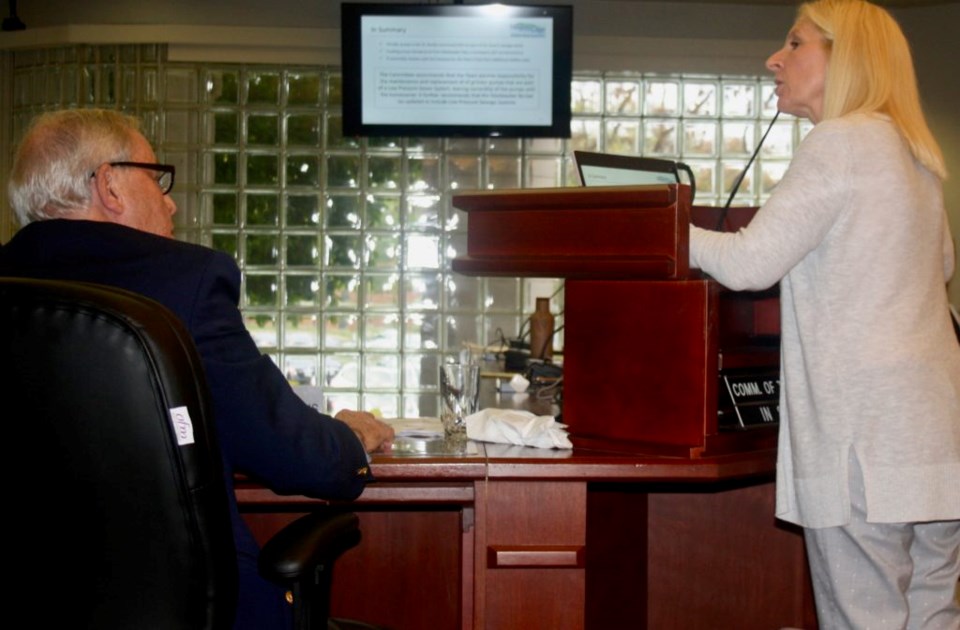
Councillors were given a crash course on grinder pumps at a workshop held Monday afternoon, along with some recommendations that since they are part of the low-pressure sewer system in St. Davids, the Town should take over responsibility for replacement and maintenance, leaving ownership of the pumps with the homeowner.
The committee also recommended the wastewater bylaw be updated, and that all residents on town sewer systems be charged $12.50 extra a year to cover the Town cost of assuming responsibility for grinder pumps, as presented by committee vice-chair Michelle Adelstein.
She was asked by Coun. Allan Bisback, who was passing along a question he’s heard from other residents, why all residents should shoulder the cost instead of just those who have grinder pumps. Adelstein explained all sewage works are paid for by all sewage users — if there are repairs to the sewage system in the Old Town, she said, as a St. Davids resident, she pays for it as well.
Everyone’s grinder pumps at this point are functioning well, said Adelstein, “but this is an evolving process.” She said homeowners and developers have to be educated and Town staff better trained to assess future installations. The Town is not currently inspecting new installations, she said. “Quality of installation is imperative.”
As subdivisions requiring new homes to have grinder pumps connect to the St. Davids sewer system, the committee recommends a high standard of grinder pump quality be clearly documented with the developer, a rigorous inspection and sign-off of the installation be implemented, and the developer be required to share some of the construction savings with the Town to defray the future cost of pump maintenance. A fee of $10,000 per new home would pay the maintenance costs for an estimated 30 to 40 years, at a cost of $3,000 for replacement pumps.
The low pressure system saves the developer a lot of money, given the cost of a traditional gravity system, and “it’s fair to ask a developer” to pay a portion of the Town’s ongoing costs, said Adelstein.
In preparing its report and recommendations, the committee researched sewage management systems and consulted with the Town’s legal counsel, who confirmed that grinder pumps are part of the Town’s communal, low-pressure sewer system, said Adelstein. “This determination was critical.”
When asked for clarification, she said the committee had a verbal discussion and agreement on that point with the Town lawyer.
The committee also consulted with the Town’s insurance broker, the Town treasurer, operations and other staff, other communities with grinder pumps, and the public through an open house in September and comments on the Town’s website, said Adelstein.
The decision by council in the early 2000’s to approve the use of a low-pressure sewer system powered by grinder pumps in Bevan Heights and on Tanbark Road was a good one, the committee said. It estimated, with input from town staff, that “tens of millions of dollars” was saved by not installing a traditional sewer system in Bevan Heights, because of the underlying structure of the escarpment, Adelstein told councillors.
But some pump owners, maybe a handful, have had multiple replacements, she said, and she has had four grinder pumps.
Through its research, the committee also came to understand the importance of grinder pump installation quality, she said, that homeowners own and operate an active part of the Town’s sewage system, and the ongoing capital costs of the system in comparison to a traditional gravity system.
The committee also heard from homeowners that they were not educated about their grinder pump or their sewage system; that they still struggle to receive proper service and to deal with technicians “that are in no way familiar or trained on the system,” and that they have concerns about what they or the Town can do during an extended power outage.
Adelstein was asked about insurance for homeowners with grinder pumps, and explained that the town had a contract with an insurance company, now expired, at a cost of $70 a year. It only covers the pump itself, she said, and she has heard of one home owner being turned down for it. The cost will likely go up, she said — grinder pumps can’t be replaced for $70 a month — and there is no guarantee the insurance will continue to be available.
Lord Mayor Betty Disero thanked the committee for doing so much work on the issue, and suggested that given council was being asked to make such a significant decision, she would like a staff report.
She said she would also like to hear from the town lawyer, to have either a written legal opinion or have him come to council, with his information on record before councillors have a discussion and make a decision about taking on the responsibility for grinder pumps.